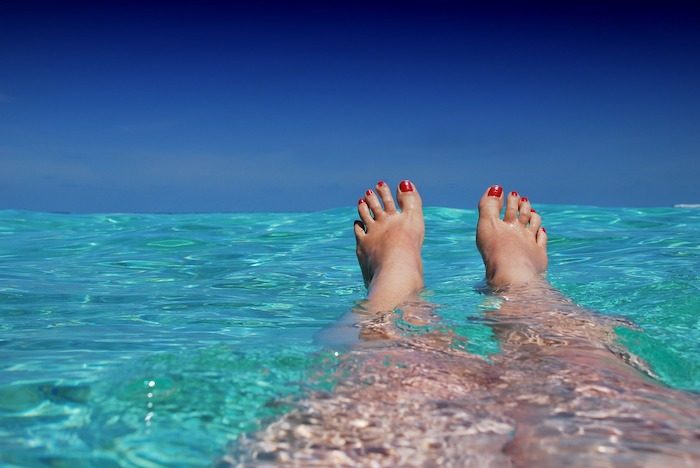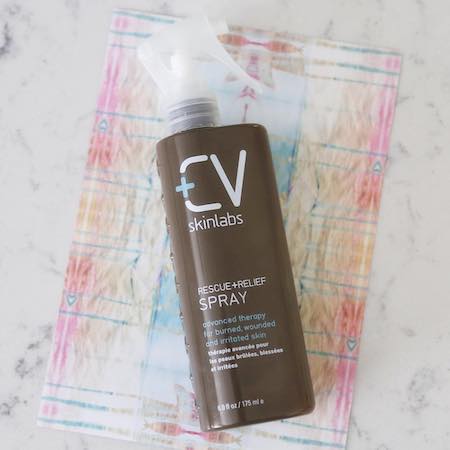
Some of our customers have been asking, “Does salt water help skin? What if it’s sensitive?”
It’s a good time of year to ask that question, as many of us are headed to the beach.
Let’s look at the pros and cons of using salt water or sea salt on your skin.
Salt Water and Skin: Together for Decades
It used to be that people would travel great distances to submerge themselves in salt water.
Back in the 1870s, travel guides compared the Great Salt Lake in Utah to the Dead Sea, touting it as a natural remedy for respiratory conditions, digestive disorders, and other chronic illnesses.
Up through the 1950s, the Great Salt Lake drew thousands of tourists in the summer. Both locals and visitors plunged in, hoping to experience the benefits.
The Dead Sea, located in the Jordan Rift Valley on the Israel-Jordan border, has been a favorite health destination for centuries. Even today, thousands of people travel there in the hopes of finding relief for psoriasis, arthritis, and heart conditions.
Taking a dip in the ocean, as well, is believed to help relieve stress, relax the body, reduce muscle pain, tame inflammation, and boost skin health.
Does Salt Water Help Skin?
If you’ve ever taken a swim in the ocean, you may have experienced its benefits on your skin. Usually, the skin feels softer and more vibrant than before you dove under.
Here’s what we know about how salt water affects the skin.
1. Doses the Skin with Minerals
Seawater is full of minerals, including magnesium, calcium, and potassium. These help combat acne-causing bacteria and skin infections. They can also help encourage the healing process, potentially soothing wounds and fading scars.
2. Naturally Exfoliates the Skin
Sea salt is naturally exfoliating. It helps slough off dead skin cells while opening the pores for a deeper clean. This is one of the reasons skin feels soft and smooth after a dip in the ocean.
3. Reduces Excess Oil/Acne
Salt water has natural moisture-reducing properties that help control excess oil. If you’re someone with oily skin who battles with acne, washing daily with a salt water solution may help improve your skin’s condition.
Seawater and salt water also kill acne-causing germs and reduce inflammation. Just be sure you always rinse well to avoid leaving salt on the skin, as excess dryness can increase acne.
4. Tames Inflammation
Salt water and sea salt minerals have natural anti-inflammatory properties. If you struggle with redness, eczema, psoriasis, or other types of inflammatory skin conditions, using salt water in your skincare routine may help.
5. May Help with Dandruff
With its natural exfoliating action, salt water can help loosen and remove dandruff from the scalp. It can also help reduce fungal growth while absorbing excess oil—all of which may improve the health of the scalp.
6. Can Help Soothe Eczema and Psoriasis
Because these are both inflammatory conditions, salt water can help improve them. It helps remove dead skin cells (softening patches) while taming inflammation and reducing redness.
In a 2016 review, scientists found that water from deep in the sea may benefit certain skin conditions like eczema. They also found evidence that it could help reduce dryness, itching, water loss, and inflammation.
7. Improves Circulation
Improved circulation is good for the skin, as it brings more nutrients to the cells that need it. Salt water contains minerals essential to maintaining healthy blood flow. Swimming or soaking in salt water also increases the heart rate, stimulating blood flow throughout the body.
8. Reduces Allergic Skin Reactions
Some research has shown that deep sea water may help reduce allergic reactions in the skin. It has a natural ability to slow the release of histamine, which is the chemical in the body that causes allergic symptoms like itching and hives.
Does Salt Water Help Skin, Even If It’s Dry or Sensitive?
Like most things, a little bit of seawater or salt water can be good for the skin, but too much may not be so good. Particularly if you have dry or sensitive skin, it’s important to use caution.
1. It May Exacerbate Dry Skin
If you have dry skin to begin with, salt water may make it worse. Because of its natural moisture- and oil-reducing properties, it can sap the skin of its natural oils, making it drier than it was before. The pH balance of the water is important too—some bodies of seawater may be more drying than others because of it. That can lead to dry, irritated skin and increased acne breakouts.
2. It May Irritate Wounds
You know how it feels when you submerge scratched or wounded skin into salt water? It stings a little, right? The salt water can help kill germs and speed up healing, but it can feel irritating in the meantime.
Some bodies of water are more polluted than others, as well. Toxins or bacteria in the water may negate the sea water’s usual healing properties. Some salt water contains mycobacteria that can lead to serious infections.
3. It May Be Too Abrasive
If you have sensitive skin, it’s best to stick with your gentle chemical exfoliants. Salt can create microtears in the skin that may react negatively with your skin. If you notice acne breakouts, redness, or irritation, stop using salt.
4. It Can Dry Out Your Hair
If you have naturally dry hair, a swim in the ocean may make it worse. Even if your hair has a normal moisture content, if you fail to wash out the seawater after your swim, you may notice dry, frizzy hair the next day. That’s because the salt and other minerals stayed on it for hours, drawing moisture out.
How to Enjoy Salt Water Benefits Without Harming Sensitive Skin
To help mediate some of the effects above while still enjoying the benefits of salt water, you can take the following steps:
- Rinse off: Thoroughly rinse off your skin with regular water after swimming in the sea or taking a salt water bath.
- Moisturize: We recommend using our CV Skinlabs products to moisturize, soothe any redness or irritation, and rebalance the PH of your skin. Our Calming Moisture and Body Repair Lotion will help you avoid dryness while allowing you to enjoy refreshed skin.
- Check hard-to-reach areas: Use our Rescue + Relief Spray to moisturize and soothe hard-to-reach areas. It works great on your back, the back of your neck, and on your scalp, where it helps restore any lost moisture and relief stinging and itching on contact.
Does Salt Water Help Skin at Home?
If you don’t live near the beach, you may wonder how to incorporate salt water or sea salt into your skincare routine. Here are a few tips:
Try Balneotherapy. This is a treatment in which the patient bathes in thermal mineral water. This may occur in the actual Dead Sea or at home when you add sea salts to your bath water. (Try one-third cup per tub full.) Balneotherapy is often used to help treat plaque psoriasis.
DIY Mist: Mix your own solution. Combine one teaspoon of sea salt with four ounces of warm water in a small spray bottle. Mist on clean, dry skin daily or twice daily. It makes a great oily skin toner.
DIY Scrub: If you have flaky skin or want to try a sea salt exfoliant, try this: Mix one teaspoon of olive oil, one teaspoon of coconut oil, and one teaspoon of sea salt in a bowl. Gently scrub it on the skin and wait five minutes, then rinse it off with a mild face wash.
DIY Mask: To reduce redness and irritation, mix a teaspoon of sea salt, a few spoons of water, and some honey to create a paste. Apply gently to the face and leave on for no more than 10 minutes. Wash off using warm water.
DIY De-Puffer: Add one teaspoon of salt to a cup of warm water. Mix until the salt dissolves. Soak two cotton balls in the solution and place them on closed eyes for a few minutes. It will help reduce inflammation.
Note: While salt water is hailed to be great for your skin, it is important to note there is little scientific studies proving these benefits. All of these claims are based on anecdotal evidence.
Have you tried salt or seawater on your skin?




